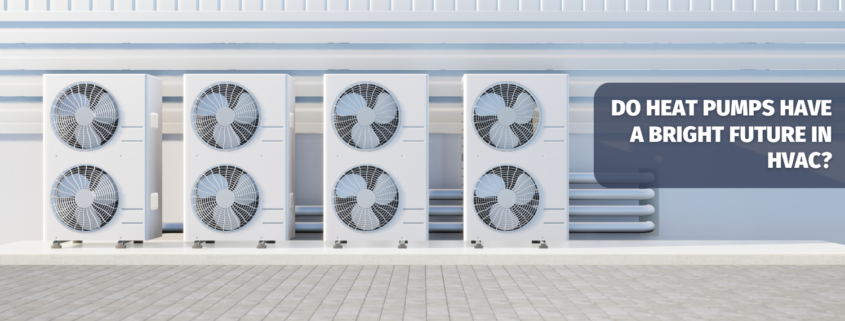As the U.S. tries to move away from reliance on fossil fuels, heat pumps undoubtedly have a bright future as an HVAC (Heating, Ventilation, and Air Conditioning) solution, even in colder climates where they haven’t traditionally been used.
Heat pumps are energy-efficient and environmentally friendly alternatives to conventional heating and cooling systems. They run on electricity, but only use it for power, not to generate heat. Heat pumps work by transferring heat from one place to another, rather than generating heat directly, making them highly efficient for heating and cooling.
They extract heat from the outside air, ground, or water sources in colder climates and transfer it indoors to heat your home. Heat pumps are typically about three times more efficient than conventional heating and cooling systems but slightly less so in extreme cold.
Several factors contribute to the increased use of heat pumps:
- Energy Efficiency: Heat pumps can provide heating and cooling using less energy compared to traditional systems like furnaces and air conditioners. This can result in significant energy savings for homeowners and businesses, lowering utility bills and reducing greenhouse gas emissions.
- Renewable Energy Integration: Heat pumps can be integrated with renewable energy sources, such as solar and geothermal energy. This allows for even more significant energy savings and reduced reliance on fossil fuels.
- Environmental Benefits: Heat pumps produce fewer greenhouse gas emissions than combustion-based heating systems. Heat pumps are crucial to achieving these goals as the world focuses on reducing carbon emissions and combating climate change.
- Technology Advancements: Ongoing advancements in heat pump technology are improving efficiency, performance, and affordability. This includes developments in compressor technology, refrigerants, and control systems.
- Incentives and Regulations: Many governments and utilities offer incentives, rebates, and tax credits to encourage the adoption of energy-efficient technologies like heat pumps. Additionally, regulations aimed at phasing out less efficient heating and cooling systems can drive the market demand for heat pumps.
- Versatility: Heat pumps can provide both heating and cooling, making them versatile solutions for various climates and applications. They can be used in residential, commercial, and industrial settings.
- Long-Term Cost Savings: While the cost of installing a heat pump may be higher upfront than traditional systems, the long-term cost savings through reduced energy consumption and maintenance can outweigh the initial investment.
- Consumer Awareness: As awareness of environmental issues and energy efficiency grows, more consumers seek sustainable HVAC solutions, which can drive the demand for heat pumps.
- Research and Innovation: Ongoing research and innovation in the HVAC industry will likely to lead to further improvements in heat pump technology, making them even more attractive and efficient.
Mainly used in warmer climates, over the past decade, heat pump technology has improved, allowing them to be used where the temperatures dip into the single digits and below. The U.S. Department of Energy is working with manufacturers to develop heat pumps that will operate efficiently at temperatures as low as -15 degrees Fahrenheit.
There are a few types of heat pumps that can be used in colder climates:
- Air-Source Heat Pumps (ASHP): These are the most common type of heat pump capable of operating in cold climates, but their efficiency decreases as the temperature drops. Some ASHP models have been designed to work efficiently even at very low temperatures, and these are often referred to as “cold climate” or “extreme cold climate” heat pumps.
- Ground-Source Heat Pumps (GSHP): Also known as geothermal heat pumps, these systems use the relatively constant temperature of the ground or a water source to exchange heat. They tend to be more efficient in colder climates than air-source heat pumps because the ground temperature remains relatively stable throughout the year.
- Hybrid Heat Pumps: These systems combine a traditional furnace or boiler with an air-source heat pump. They switch between the two heat sources based on the outdoor temperature to optimize efficiency.
- Ductless Mini-Split Heat Pumps: These systems consist of an outdoor unit and one or more indoor units, allowing for zoned heating. Some ductless mini-split models are designed to work effectively in cold climates.
Overall, the combination of energy efficiency, environmental benefits, technological advancements, and supportive policies positions heat pumps as a promising and increasingly popular choice for HVAC solutions in the future.
Federal tax credits are available (if you qualify) for purchasing and installing a heat pump. Additionally, many states, including New York, offer subsidies to cover the cost. There may be income eligibility guidelines, but most states provide some incentive for anyone switching to energy-efficient heat pumps.
————————————————————————————————————————————————————————————————————————————————————–
ICM Controls manufactures both OEM and aftermarket products under its own brand names for HVAC, Electrical, pool & spa, marine, and recreational vehicle markets.
We manufacture a wide range of Surge Protection Devices, Line Voltage Monitors, Fan Blower Controls, Time Relays, Defrost Boards, and Universal Furnace Control Boards. We have worked closely with some of the world’s most renowned business giants for decades. To learn more, visit icmcontrols1.wpengine.com









